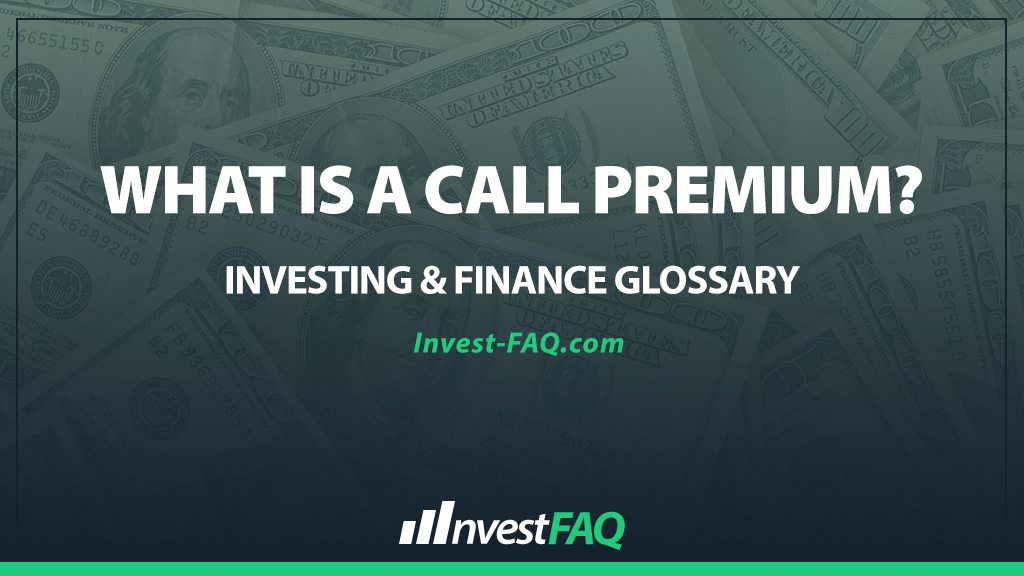
Call Premium
Contents
A call premium is the additional amount above the bond’s par value that a bond issuer agrees to pay to bondholders if the bond is redeemed before its maturity date. It compensates the bondholder for the loss of potential interest income that would have been earned if the bond had remained outstanding until its scheduled maturity.
Businesses issue callable bonds with a call premium to retain the flexibility to refinance debt if interest rates fall. This feature allows issuers to lower their interest expenses by redeeming high-interest bonds early and reissuing new bonds at lower rates. For investors, the call premium offers a form of protection and incentive, compensating them for the reinvestment risk and the loss of future interest payments.
Example of a Call Premium
Imagine “GreenTech Manufacturing Inc.” issues callable bonds with a total face value of $1,000,000, a 5% annual coupon rate, and a call premium of 2%. Five years into the bond’s term, interest rates have dropped significantly, prompting GreenTech to exercise the call option to redeem these bonds early.
Initial Bond Issuance: Recorded at the face value of $1,000,000 on GreenTech’s balance sheet under long-term liabilities.
Annual Interest Payments: GreenTech records an annual interest expense of $50,000 (5% of $1,000,000) and reduces cash accordingly.
Redemption of Bonds: To call the bonds early, GreenTech pays a total of $1,020,000, which includes the $1,000,000 face value plus a 2% call premium ($20,000).
By redeeming the bonds early and paying the call premium, GreenTech can take advantage of lower prevailing interest rates to refinance its debt, potentially saving on future interest payments. The accounting treatment of the call involves removing the bond liability from the balance sheet and recognizing the call premium paid as an expense, which reduces the company’s equity.
This transaction reflects the company’s strategic financial management decision to optimize its capital structure in response to changing market conditions.
Significance for Investing & Finance
The concept of a call premium is significant in accounting and financial management for several reasons:
Cost of Refinancing: The call premium represents an additional cost of refinancing debt that must be weighed against the potential savings from lower interest rates.
Investor Compensation: It acknowledges the importance of compensating investors for their reinvestment risk and the early loss of expected interest income, affecting the attractiveness of callable bonds.
Financial Strategy: The decision to call bonds early reflects a strategic approach to capital management, requiring careful analysis of market conditions, interest rates, and the company’s long-term financial strategy.
Regulatory and Disclosure Requirements: Proper accounting for the issuance, servicing, and early redemption of callable bonds, including call premiums, ensures compliance with financial reporting standards and transparency for investors.
In summary, a call premium is a critical element of callable bonds, representing the cost to the issuer for the flexibility to manage debt obligations strategically.
Accounting for call premiums involves recognizing the expenses associated with early redemption, which impacts both the company’s financial statements and its overall financial strategy.
FAQ
The call premium for a callable bond is typically set at issuance and is based on the bond’s terms and conditions, often reflecting the issuer’s assessment of the cost of early redemption and the need to make the bond attractive to investors by compensating them for potential lost interest income.
Paying a call premium does not directly affect a company’s credit rating; however, the underlying reasons for the bond’s early redemption, such as debt restructuring or interest rate management, and the company’s overall financial health following the transaction, could influence its credit assessment.
The call premium is usually fixed and specified in the bond’s indenture at issuance, providing certainty to both the issuer and the investors; however, some bonds may have provisions that allow the call premium to decrease over time, known as a declining call premium schedule.
The existence of a call premium can make callable bonds more attractive to investors by offering additional compensation for the risk of early redemption, which might result in reinvestment risk or the loss of future interest payments, affecting an investor’s yield expectations and decision-making process.
